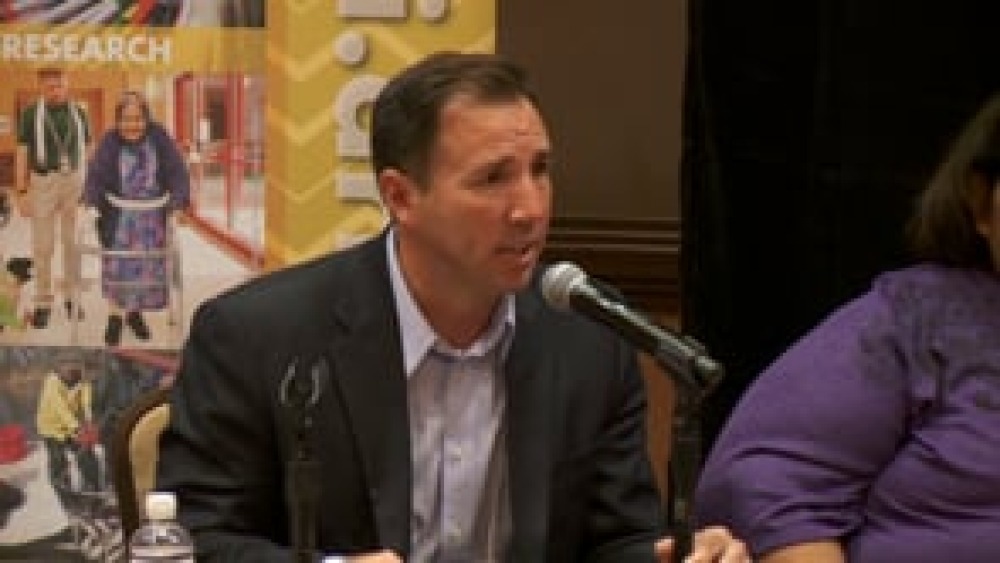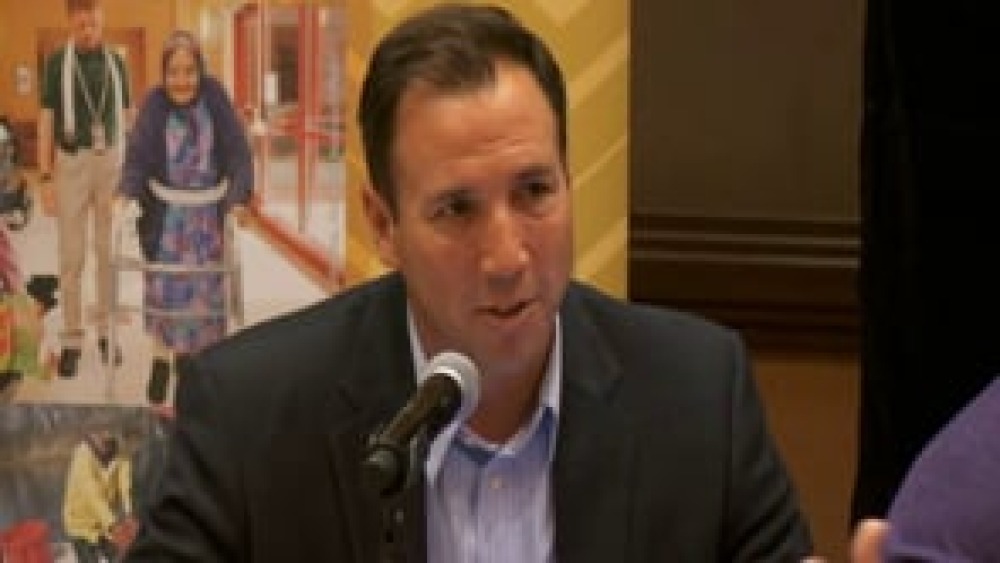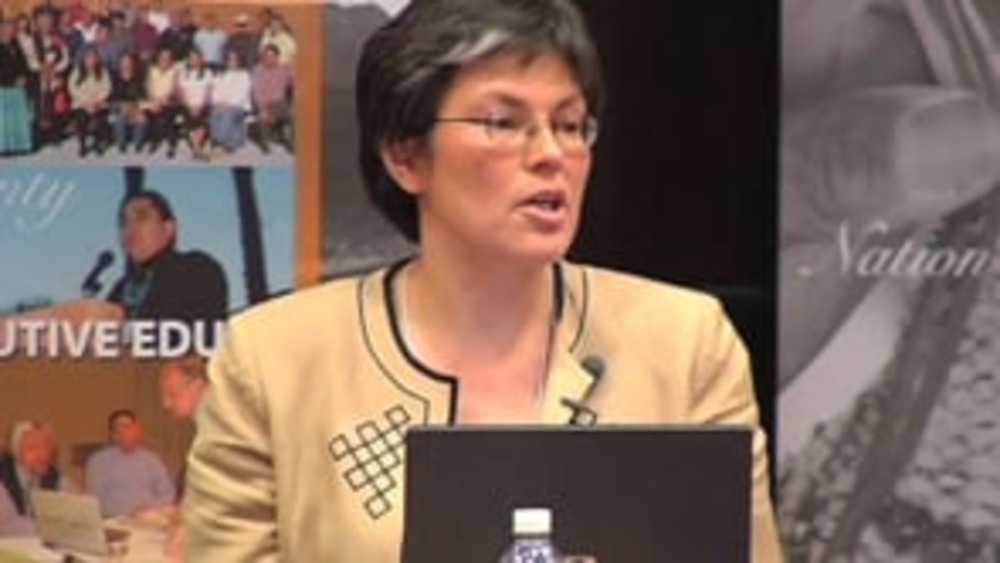Vice Chairwoman of the Pascua Yaqui Tribe Catalina Alvarez shares what she wishes that she knew before she first took office, and focuses on the importance of elected leaders understanding -- and confining themselves to performing -- their appropriate roles and responsibilities.
Additional Information
Alvarez, Catalina. "What I Wish I Knew Before I Took Office." Emerging Leaders seminar. Native Nations Institute for Leadership, Management, and Policy, University of Arizona. Tucson, Arizona. October 10, 2012. Presentation.
Transcript
Catalina Alvarez:
"Thank you again for inviting me to speak on ‘what I would have known.' I think a lot of us as tribal leaders, especially for myself, we don't get into politics unless we know that either we wanted to see change...or we wanted to get revenge on someone, the director, or we really wanted to just for the prestige of being on council. My reason at the time was probably all three. And as a past employee of the tribe I think that one of our health directors, our council at that time never visited Guadalupe -- I live in Tempe area -- and never visited the community, we never saw a councilman really. I didn't even know who was actually on council at that time, so our grant was going to come to an end so when I asked them, ‘Why aren't these services being provided off the reservation? Why aren't we getting the same benefits?' and one thing they had told me was, ‘Well, if you want to see change, well, get on council.' So I'm like, ‘Okay, so I'll go to get on council.' But if I would have known the responsibility it is and the time consuming...I think I would have thought differently.
But it has been...I think the most difficult thing as a council is the time away from home and your families, the time that you spend at work is just tremendous, because as you come in...the council that I came into, we were fortunate I guess and unfortunate at the same time that we had the council that actually were there trying, at the time that the incorporation started and were still working. And I say it's fortunate because at least we got their experience as the tribal leaders that actually got us incorporated as a tribe, but also their mindset sometimes is set in the old ways. And when you have new faces, new council, younger council, we want to do things differently, we see others like the government as well and they don't, we tend to, I think the old council has the old mind frame that things should be done differently or they should stay the same. And so that's why I say that it was a good and bad.
But I think the difficult part of it was also to be able to get the council to agree on a vision for the tribe because you had so many different personalities, many different reasons and why they were on council. And it was, like I said for myself, when you get into council you don't realize the work behind the scene. And just like I said, as a council member, you'll be blamed either way if you do things right or wrong because sometimes it's even difficult to understand for our constituents and our employees that things have to be kept confidential. And what should and not -- that's always a fine line like our community expects to know certain things and should you give that information up or not. So that was one of the aspects of that.
Also to me, what overwhelmed me was -- going back to the previous presentation -- is that as a council you are the one that actually makes the laws, the ordinances but also set the foundation for the future. And that's a big responsibility, especially if you don't know what laws already exist. So you spend a lot of time as a new council being overwhelmed and trying to catch up. And like this council, with the new council members, I know that there's 11 council members in the tribe. We really didn't wait for them, we just kept on going, which I think we realize now...because I remember Rosita [Alvarez] was asking me, ‘So what are we supposed to do with these packets?' I mean simple as a study session, the day-to-day things that go on in the tribe, the previous council that was re-elected, I think we just kept on going, we didn't even both asking them how to get you up to speed on what was going on. I think as you're getting up to speed also having them understand where we were left off on some of the ordinances, the laws and also the foundation that you not only do for the government but for your enterprises and what best fits for those enterprises. Currently our tribe is also responsible like, we had a gaming board a couple years ago but the council at that time dissolved the gaming board. So council is not only the government part of it but it's also over the enterprises, the Chevron, and the gaming.
So we still have that discussion, ‘What is more beneficial as a council person?' I mean, of course I think the big, the one thing that I think as a council person that you should have in the back of your mind is that to acknowledge at least that you need help in finding the best quality person that you can for those positions. And I think that's one of the most surprising thing to me was that we have...or at least I say it that...it made me more cynical on things I think being on council because you have people that come in and still think that the council is like a social service, social service workers, and you've got to kind of separate yourself from that aspect and also just be...I think we, as a council you are more cynical because you're on the other side now. And is it really a need when everything else is going on?
The other thing is also...I lost my train of thought. But just on those aspects and just knowing that as the directors that you have, I think the council that we sit on, it's all 11, we all are re-elected, we don't have staggered terms. So it's very difficult sometimes to get started again I think even if it's half of the council that comes in as new. A lot of times as council you tend to forget that, at least in, this is my third term in council, is knowing if your finance director or your gaming person, your directors are actually telling you the truth on the numbers and that has been the biggest challenge for me as on council because we have. Since the council is over the gaming, I think they're too comfortable with the council, our gaming executives. So I think that's very, that's one of the things that I think that should, if I would have came back and done things differently is I would have made myself more aware of all the laws and things that were going on with the tribal council and the government at that time, even on the enterprise part of it.
But I think as a tribal leader, you don't think about, I mean as a newly elected [leader] you don't think about those things, you just think about what you will want to do as a council member, how you will want to improve things and how things should be done. But a lot of times we don't even think that those things as a council, the way you're going to get things done is by doing ordinances and strengthening your policies and not necessarily going and micromanaging the departments, which is a fine line because it's very difficult, especially if you have a council that is working and is there every day. And so I think it warps kind of the...your responsibilities. Because we still, like I said, have council that have that mind frame that when something happens, the community will run to that council or if they expect you to be at all the events or for you to solve all their problems and it's not, that's not what as a legislator you're there for. And I think that's one of the key qualities is that you need to know how to [not] micromanage, you need to have good leadership and especially know how to delegate and also to be able to speak out as an individual because of your integrity. Like, how strong are you on your commitments? How strong are you willing to go against the whole council if you feel the decision is not right? The previous council that I was with, I was the only female at that time, so it was very difficult for me because they had this ‘good ‘ole boys' network going on for years. You have to be strong enough to be assertive, to be able to get your point across and to get the things that need to be done the way you feel like, the way you think that you would be...the way the community would think.
And I know that as...when I came into council, I said, ‘Well, I'm not a politician, I'm not a politician.' But you've got to act like a politician if you...you've got to start lobbying your council to be able to move things because otherwise you cannot move on anything as a solo person. So that's one of the...I think one of the key elements that I've learned throughout the years is that if you don't know how to lobby, if you don't know how to be assertive and actually not get involved with the community aspect like keeping your distance from being biased. Because of course in our tribe everybody seems to be related. No matter what decision you make, it'll impact the family that you...or the families or the community that you live in.
And having strength even though that your constituents are telling you to vote a way that they would want to see; I think the biggest challenge is...because they don't see, and as a council I think that you have to do your own research and get the most information you can to make the best decision for the tribe and not just for that one individual. And not to make laws or pass ordinance for just one individual and not...because we have a tendency to work as a tribe or as a council at one time just to put out fires; that's all we did. This situation comes up, we're all over there and we'll try to fix this and we don't see overall.
And I think as a council, as a newly elected [leader], not only do you have to deal with your own constituents but how you relate to the state and how you lobby the state on some of the monies that you receive and even the laws that are being proposed even in the federal government and knowing how to actually go and lobby and meet with your representatives. And I think that was the biggest awakening for myself because I didn't realize how much of a detail and how much of a responsibility it is as being a councilperson.
If I would have done things differently, I don't think I would have ran for council, at least not until I knew a little bit more on what the responsibilities are. I think everybody that runs for council eventually runs because they genuinely want to see the community change or want to better the future of the tribe. Thank you."



